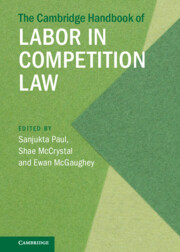Book contents
- The Cambridge Handbook of Labor in Competition Law
- The Cambridge Handbook of Labor in Competition Law
- Copyright page
- Contents
- Contributors
- Preface
- 1 Labor in Competition Law
- 2 Collective Labour Rights for Working People
- 3 Economic Coordination as Freedom of Association
- 4 The State’s Power to Govern in This Field Is Paramount: Antitrust, Labor, and the First Amendment
- 5 Competition Law as Collective Bargaining Law
- 6 Antitrust, Free Trade, and Fissuring
- 7 American Antitrust Exceptionalism
- 8 Competition and Labour Law in Canada
- 9 Workers and Competition Law in Japan
- 10 Workers and Competition Law in Australia
- 11 Workers and Competition Law in New Zealand
- 12 Competition Law and Labour Law
- 13 Workers and Competition Law in India
- 14 Competition and Labour Law in the United Kingdom
- 15 A Solution in Search of a Problem?
- 16 Competition and Labour Law in Germany
- 17 Labour Law and Competition Law Under French Regulation
- 18 Competition Law, Cartels and Collective Bargaining
- 19 The EU, Competition Law and Workers Rights
- 20 Is South American Collective Labor Law Confronted by Competition Law?
- 21 Conclusion
19 - The EU, Competition Law and Workers Rights
Published online by Cambridge University Press: 05 May 2022
- The Cambridge Handbook of Labor in Competition Law
- The Cambridge Handbook of Labor in Competition Law
- Copyright page
- Contents
- Contributors
- Preface
- 1 Labor in Competition Law
- 2 Collective Labour Rights for Working People
- 3 Economic Coordination as Freedom of Association
- 4 The State’s Power to Govern in This Field Is Paramount: Antitrust, Labor, and the First Amendment
- 5 Competition Law as Collective Bargaining Law
- 6 Antitrust, Free Trade, and Fissuring
- 7 American Antitrust Exceptionalism
- 8 Competition and Labour Law in Canada
- 9 Workers and Competition Law in Japan
- 10 Workers and Competition Law in Australia
- 11 Workers and Competition Law in New Zealand
- 12 Competition Law and Labour Law
- 13 Workers and Competition Law in India
- 14 Competition and Labour Law in the United Kingdom
- 15 A Solution in Search of a Problem?
- 16 Competition and Labour Law in Germany
- 17 Labour Law and Competition Law Under French Regulation
- 18 Competition Law, Cartels and Collective Bargaining
- 19 The EU, Competition Law and Workers Rights
- 20 Is South American Collective Labor Law Confronted by Competition Law?
- 21 Conclusion
Summary
This paper delves into the ways in which EU competition law affects the right of workers to organize and combine with each other and act, collectively, in the furtherance of their rights and interests at work, in particular by means of collective agreements concluded with one or more employers. It begins by opposing the limited ‘labour exemption’ contained in the recent competition caselaw and contrasts that with a more traditional ‘labour law’ approach, that would typically see collective bargaining as a fundamental, and universal, labour rights to be enjoyed by all workers, or in the alternative will have to integrate the asymmetry of bargaining power between labour and digital monopsonies. We put forward a more nuanced and balanced approach, by reference to the concept of ‘predominantly personal work’, that could act as the new watershed concept around which labour rights and competition law could define their respective fields of operation and which may already inspire the recent Commission’s proposals enabling self-employed without employees (“solo self-employed”) to access the right to bargain collectively on a number of issues with digital platforms.
- Type
- Chapter
- Information
- The Cambridge Handbook of Labor in Competition Law , pp. 280 - 297Publisher: Cambridge University PressPrint publication year: 2022

